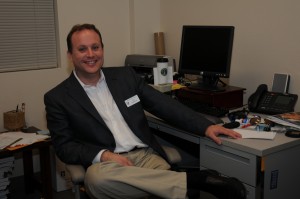By Karen Gavis/se news editor
SE Campus psychology associate professor Karl Des Robinson teaches using an array of honed teaching skills and a bit of magic as well.
“Does anyone
even care?” Robinson asked his Introduction to Psychology class while steadily maintaining a signature pace. His question regarding neurotransmitters and their role in the synapses met a lingering silence.
“Well, you better start caring,” he told his students. “This is what makes you work, people.”
Robinson claims no special talents.

“There is no Criss Angel,” he said during one class session, referring to the magician.
He said that magic is simply illusions, tricks of the mind, and he could do anything himself that David Blaine could do.
Robinson pulled out a bag of tricks and then revealed his magic wand, which also doubled as a writing instrument. After a mischievous grin, he chose a student from the front of the class, laid three cards face down on the table and asked her to pick a card. She did. He then asked her to read what was written on the bottom of the card she had chosen.
“You will choose this card,” she read.
No one said anything.
Then, a student from the back of the classroom said, “You had a 30 percent chance of her picking the right card.”
“Yes, but I had a 60 percent chance of looking like a fool,” Robinson said. “Do you think I’m going to do that?”
“Do it again,” another student said.
“Yeah, do it again,” several more voices chimed in.
He shrugged and laid out three more cards. This time, the middle card was chosen. Nothing was written on the bottom of the card. The wizardly professor explained that in this case, he would have a simple response.
“I have another card in the bag, reach in and read what it says,” he said. “It would read, ‘You will choose the middle card.’”
In other words, whichever card was chosen determined his next move. And no matter which card it was, he had an answer lying in wait.
Robinson said human brains are actually quite lazy and do not particularly care for thinking. Brains, like people, prefer an easy route.
This was the reason, Robinson said, he continually asked his class random, critical thinking questions to provoke thought, as much as that pained them.
After noticing that some of his students were curious and inquisitive about topics such as ESP and the paranormal, he began performing magic about five years ago to aid in his teaching. He said performing acts of illusion himself would show that if he could do it, anyone could.
Robinson said he has learned from mentalist Richard Osterlind and is also a fan of James Randi and Banachek.
Cherae Burton was a student last spring in Robinson’s Introduction to Psychology class.
“I liked him a lot,” she said. “I felt like he was a great instructor who made things interesting and also taught you all that you needed.”



























